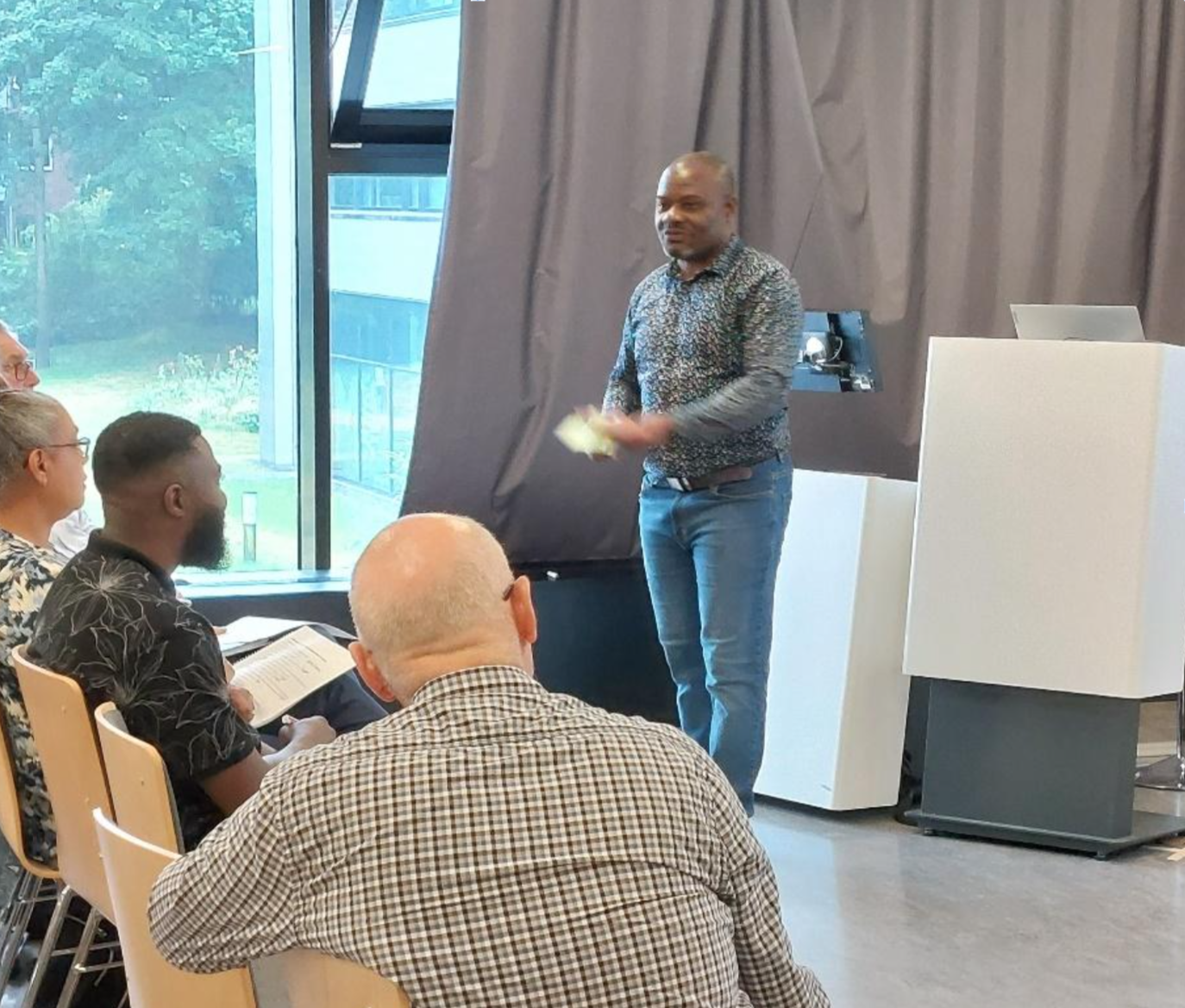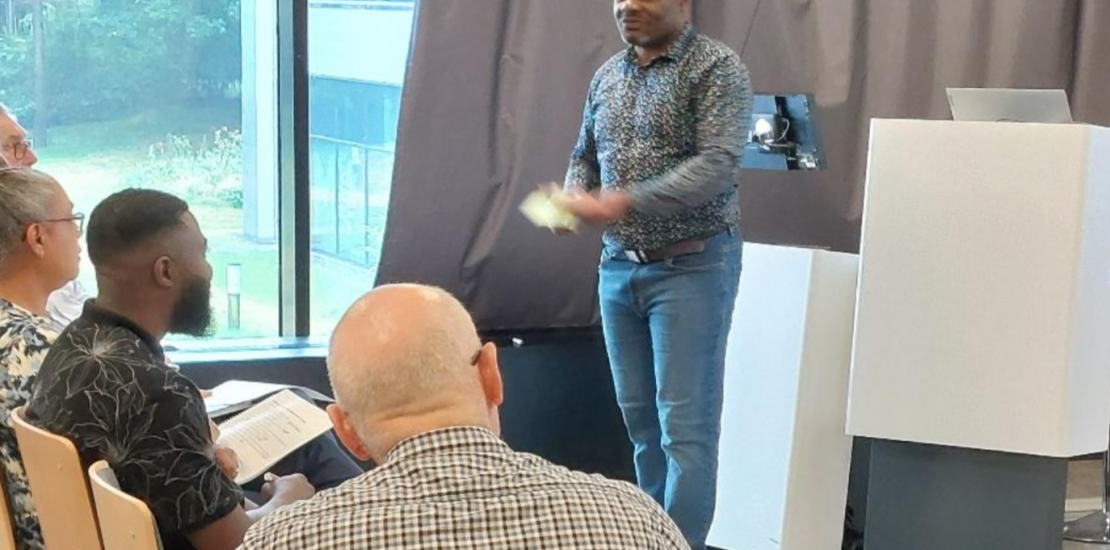
Event review of the HELTA & T4S workshop with Eric Ekembe
Developing Activities Around Discrete Aspects of the English Language
a HELTA and t4s workshop with Eric Ekembe
by Vincent Wongaiham-Petersen
One might be predisposed to dismiss today, 1st of July 2023, as just your typical summer day in Hamburg: bleak and gray at 16 degrees with the clouds alternating between giving us a drizzle or an outright downpour. But there was nothing typical about this day at all. Here we were back to doing a face-to-face event at the BMK (Berufliche Schule für Medien und Kommunikation) and this time around, we were putting up a joint event with t4s (teachers 4 schools). And what’s more, we had Eric Ekembe flying in all the way from Cameroon to do a workshop on “Developing Activities Around Discrete Aspects of the English Language”.
After a few introductory words from me and Andreas Grundtvig about HELTA and t4s respectively, Eric took the floor. He modestly set the bar low by saying that he won’t be giving us anything new that we won’t already know as experienced teachers. But he did hope that his workshop could show us “different ways to do things better”.
And it won’t be a spoiler to say that he certainly did!
He started off by giving us some quick explanations of several learning concepts. Then we went on to some hands-on exercises that looked at different aspects of grammar.
Take a look at this exercise that got a roomful of teachers animatedly discussing in groups.
Say whether you agree or disagree with the following statements.
- We use the past simple for past recent action/activity.
- We use the indefinite article with invariable nouns.
- In the if-clause of type two conditional, we use was instead of were.
- We use the definite article with names of jobs and professions.
- We can use the by-phrase in the passive voice if the subject of the active is definite (e.g, someone you know).
- We write the verb in the past participle form when it follows the modal auxiliary.
- If the statement is affirmative, the tag question is affirmative.
- We place the negation marker not before the auxiliary verb.
- If we used the past simple in the if-clause, we have to use the perfect conditional in the resulting clause.
- Each time we see has/has/had, the verb following immediately is in the past simple tense.
- We use ing-adjectives to express people’s feelings.
- We use indefinite articles with non-count nouns.
- We add s/es to the verb when the subject is I.
- We use the auxiliary verb after the wh-question word when the answer to the question is yes or no.
- We place the definite article in front of a common noun.
Were you able to think of examples to prove or disprove the above statements? Suffice it to say that we certainly got a taste of the confusion and pressure that some of our students have probably felt at times when confronted with all things “grammar”.
Discussing the activity later on, some of the teachers gave us their ‘aha’ moments: One mentioned appreciating the need to contextualize the grammar point to be taken up so that learners will have an easier time understanding how the grammar is being used; another mentioned wanting to move quickly from the theoretical to the practical use of the language; and one mentioned missing having sample sentences which would have quickly helped prove if the statements were right or wrong.
But the real ‘aha’ moment came when Eric told us what the whole point of the exercise was about: In getting so caught up with discussing the merits of each statement, we didn’t notice that we were actually communicating with each other intensively while negotiating each statement. This was what the whole activity was about: Using the discussion on grammar to precipitate natural discussions and very beneficial learner-learner interaction!
And what’s more: While our students discuss and negotiate these statements with one another, we ensure that their body of language gets “stretched”. They may struggle with the language, but they will be learning at the same time. And because they are “co-constructing” the grammar rules during their discussions, they will be hyper conscious about using these grammatical rules in the future. Eventually this gets transformed into automatic behavior. And all of this without torturing our learners with all things “grammar”!
As Eric put it: Our students are exposed to a wholistic interaction of grammatical structures when learning language. So why shouldn’t we get our students learning the same way?
Eric closed the workshop by giving us some background on CAMELTA, the teaching association he is active in in Cameroon, and what some of the typical problems they face are: for example, the paucity of coursebooks – just imagine having 200 students in a class sharing a maximum of four coursebooks!
So what was the solution? Their member teachers pooled together printed materials from their and their students’ everyday lives: instruction manuals, medicine leaflets, etc., and basically put together a bank of learning materials that are as good as or one can argue, even more relevant than those found in coursebooks.
The necessity of finding alternatives to coursebooks thus instituted a shift in practice. Here are just some of the language learning activities they’ve had: Having a student show and tell their fellow students how to cook a dish or having the class work on recycling materials by refashioning them into useful products.
This led to our last ‘aha’ moment: Questions of motivation and engagement are indeed universal. Even if our students in Germany generally don’t suffer for a lack of coursebooks in our classrooms, we still need to find creative ways of getting our students involved in their own learning. This will build their trust in themselves, develop their self-confidence, motivate them, engage them.
And the cherry on top? Eric ended the workshop by teaching us a little Cameroonian dance!
All in all, it was a very motivating and engaging day in the company of a motivated and engaged speaker and motivated and engaged teachers. And we can’t wait to go back to school on Monday and motivate and engage our students, too.
Bleak and gray the day may have been, but there was nothing bleak and gray about this workshop at all!
For more info on how you could help and support t4s, please go to their website (https://t4s.info/).
Here’s a video with some highlights of the talk made by Wilton Mills:
Click here to see it!
- 6. July 2023
- Posted by: Vincent Wongaiham
- Category: Event review

